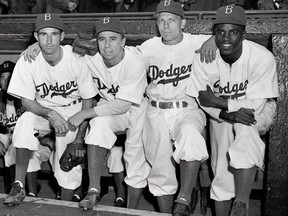
Article content
On this date, April 11, in history:
In 1506, construction began on the new St. Peter’s Basilica at the Vatican under the guidance of Pope Julius II, who enlisted the talents of Michelangelo and Raphael. The original church had been built in the Fourth century. The new one was not finished until 1626.
Article content
In 1689, William III and Mary II were crowned as joint sovereigns of Britain.
Advertisement 2
Article content
In 1713, the Treaty of Utrecht — under which France ceded Hudson Bay, Acadia and Newfoundland to Britain — was signed.
In 1755, British doctor and surgeon James Parkinson was born. He identified the neurological ailment that became known as Parkinson’s disease.
In 1768, fire destroyed one-third of Montreal. It was one of several major fires in the community in the 1700s, a time when most of Montreal was built out of wood and there was no fire pump. The only way to fight fire was with pails of water.
In 1814, Napoleon Bonaparte abdicated as emperor of France and was banished to the island of Elba.
In 1890, John Merrick, afflicted by a disfiguring disease that led to his being known as the Elephant Man, died in London at the age of 28.
In 1899, the treaty ending the Spanish-American War was declared in effect.
In 1904, Sydney, N.S., was incorporated as a city.
In 1917, Hockey Hall of Fame broadcaster Danny Gallivan was born in Sydney, N.S. He broadcast more than 1,900 Montreal Canadiens games between 1952-84 — a period in which the Habs won 16 Stanley Cups. Gallivan made such phrases as “cannonading drive,” “Savardian spin-a-rama,” “rapier-like glove save” and “headmanning the puck” part of Canada’s vocabulary. He died on Feb. 24, 1993.
Advertisement 3
Article content
In 1919, the International Labour Organization was established. It became a UN agency in 1946.
In 1940, women were allowed into the Quebec legislative assembly chamber for the first time.
In 1945, Allied troops liberated the Buchenwald death camp, 200 kilometres southwest of Berlin.

In 1947, Jackie Robinson broke baseball’s colour barrier when he made his major league debut, playing in an exhibition game between the Brooklyn Dodgers and the New York Yankees.
In 1951, British police recovered the Stone of Scone which had been stolen the previous Christmas Day from London’s Westminster Abbey. It was taken by students demanding an autonomous parliament for Scotland. The 220-kilogram stone was part of the coronation ceremonies for British monarchs since being taken to London from Scotland in 1296. It was finally returned to Scotland 700 years later, in 1996.
In 1951, U.S. president Harry Truman announced he had fired Gen. Douglas MacArthur as commander of UN forces in Korea. MacArthur had challenged Truman’s war strategy.
In 1961, accused Nazi war criminal Adolf Eichmann went on trial in an Israeli court. He was convicted and executed.
Article content
Advertisement 4
Article content
In 1963, Pope John XXIII’s encyclical On Peace in Truth, Justice, Charity & Liberty was published.
In 1970, Apollo 13 blasted off on a mission to the moon. But an on-board explosion on April 13 crippled the spacecraft, forcing it to return to Earth four days later.
In 1971, Toronto doctors performed the first successful operation in Canada to separate conjoined twins.
In 1973, Martin Bormann, who was Adolf Hitler’s personal secretary during most of the Second World War, was officially declared dead. His skeleton had been discovered four months earlier by Berlin construction workers.
In 1979, Idi Amin was deposed as president of Uganda.

In 1984, the first baby to emanate from a frozen embryo was born in Melbourne, Australia.
In 1984, Soviet Communist Party leader Konstantin Chernenko became the country’s president. He died less than two years later and was succeeded by Mikhail Gorbachev.
In 1987, Primo Levi, a Jewish-Italian chemist, Holocaust survivor and author of memoirs, short stories, poems and novels, died after falling from the interior landing of his third-storey apartment in Turin, Italy, to the ground floor, leading to speculation he killed himself. His book, “If This Is a Man” (published in North America as – “Survival in Auschwitz”) has been described as one of the most important works of the 20th century. He spent nearly a year in the Nazi death camp at Auschwitz between February 1944 and January 1945.
Advertisement 5
Article content
In 1990, Toronto Maple Leafs owner Harold Ballard died at age 86.
In 1991, a permanent ceasefire in the Persian Gulf War took effect.
In 2002, the UN established a permanent International Criminal Court for crimes against humanity.
In 2003, the northern Iraqi city of Mosul fell into U.S. and Kurdish hands with the surrender of an entire corps of the Iraqi army. The city quickly descended into lawlessness, with looting, arson and shootings. U.S. special forces were sent in to restore order.
In 2005, a $7 billion class-action suit was launched on behalf of 100,000 farmers in four provinces, accusing the Canadian government of negligently allowing mad-cow disease to devastate the cattle industry.
In 2006, Iran announced it had successfully enriched uranium for the first time.
In 2007, Canadian soldiers Allan Stewart and Patrick James Pentland were killed in two Taliban attacks in Afghanistan.
In 2008, the Supreme Court of Canada unanimously ruled in favour of restoring a Federal Court order that the RCMP must serve all of New Brunswick in both English and French and respect unique language protections in Canada’s only officially bilingual province.
Advertisement 6
Article content
In 2010, Canadian soldier Pte. Tyler William Todd was killed and another injured by a powerful roadside bomb while on foot patrol in Belanday, eight kilometres southwest of Kandahar city. His death raised to 142 the number of Canadian soldiers killed since the Afghan mission began in 2002.

In 2011, Ontario Justice Donald Taliano declared the federal medical marijuana program to be invalid, along with laws prohibiting possession and production of cannabis, since they can be used to criminally charge medical users unable to get the drugs through legal means. (The ruling was stayed in June after the Crown appealed.)
In 2011, France became the first country to ban Islamic face veils anywhere in public. (A similar ban took effect in Belgium in July.)
In 2011, an explosion tore through a key subway station in the Belarusian capital of Minsk during evening rush hour, killing 13 people and wounding over 200.
In 2011, Alassane Ouattara, Ivory Coast’s elected president, used his troops and French tanks and air power to oust strongman Laurent Gbagbo, pulling him from his burning residence and ending their four-month standoff.
Advertisement 7
Article content
In 2012, George Zimmerman, 28, the Florida neighbourhood watch volunteer who shot and killed unarmed 17-year-old Trayvon Martin on Feb. 26, was arrested and charged with second-degree murder after mounting protests over racial profiling and controversial self-defence laws in Florida and other states galvanized the U.S. (In July 2013, a jury found Zimmerman not guilty.)
In 2013, comedian Jonathan Winters, whose breakneck improvisations inspired Robin Williams, Jim Carrey and many others, died at age 87. The Jonathan Winters Show aired in the 1950s and he returned to TV in 1981 as the son of Williams’ goofball alien in the final season of Mork and Mindy.
In 2018, an Algerian military plane carrying soldiers and their families crashed soon after takeoff into a field 30 kilometres south of Algiers, killing 257 people in the worst aviation disaster in the country’s history.
In 2018, Philadelphia 76ers rookie point guard Markelle Fultz became the youngest player in NBA history (19 years, 317 days) with a triple-double.
In 2019, police in London arrested WikiLeaks founder Julian Assange at the Ecuadorian embassy on a court warrant dating back to 2012. Ecuador’s president said his government had withdrawn asylum status, citing what he called “repeated violations of international conventions and daily-life protocols.” Assange hadn’t left the embassy since August 2012, for fear he would be arrested and extradited to the U.S. for publishing thousands of classified military and diplomatic cables through his WikiLeaks website.
Advertisement 8
Article content

In 2020, Edmonton Oilers forward Colby Cave died. The 25-year-old suffered a brain bleed earlier in the week, and was placed in a medically-induced coma at Sunnybrook Hospital in Toronto.
In 2020, Opposition parties agreed to support the Liberal government’s massive $73 billion wage subsidy program in response to the COVID-19 pandemic. The House of Commons held an emergency sitting in order to pass the legislation, which was assured after Conservatives dropped their attempt to tie the bill to the longer-term question of how Parliament should function in the midst of a national health crisis.
In 2021, Nomadland won four prizes, including best picture, at the British Academy Film Awards. The film’s director, Chloe Zhao, became only the second woman to win the best director trophy. Star Frances McDormand was named best actress.
****
Article content





